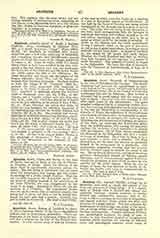

Anatolius, Saint, Patriarch of Constantinople in the time of Theodosius the Younger. The heretic Dioscurus had favored his appointment as patriarch, hoping for his support, but he found in Anatolius a determined enemy, who in the Council of Chalcedon condemned him and his followers. How he died is disputed, but it would appear that the heretics put him to death. Baronius says this occurred in 458 after eight years in the patriarchate. The great annalist condemns him in a somewhat violent manner, for conniving with Dioscurus for his appointment to the see; for demanding in contravention of the statutes of Nica, the supremacy of Constantinople over Antioch and Alexandria; for insincerity in opposing a new formula of doctrine; for declaring that Dioscurus was not condemned at Ephesus, on account of the faith; for removing the meritorious.t tius from the archidiaconate, and naming the unworthy Andrew; for weakness, if not connivance in dealing with the heretics. All of these serious accusations are discussed by the Bollandists, who give a verdict in favor of Anatolius. He is held by them to be a true Catholic, a saint, and a prophet. The Pope blamed him, not for error but because he permitted himself to be consecrated by a schismatic. One enthusiastic biographer narrates that his miracles and his combats equal in number the sands of the sea. He was born at Alexandria, and before becoming patriarch distinguished himself at Ephesus against Nestorius, and at Constantinople against Eutyches, though the profession of faith which he drew up was rejected by the papal legates. When he was in danger of death he was restored to health by St. Daniel the Stylite, who came to Constantinople to see him. His feast is kept July 3.
T. J. CAMPBELL

